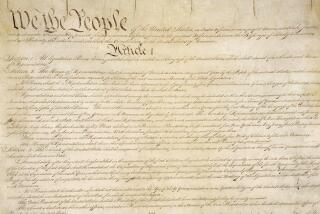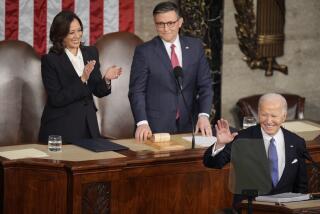McManus: Obama’s call to arms
On the eve of Inauguration Day, White House political strategist David Plouffe promised that President Obama’s inaugural address would include a call for bipartisan cooperation.
“He is going to say that our political system does not require us to resolve all of our differences or settle all of our disputes, but it is absolutely imperative that our leaders try and seek common ground,” Plouffe said on ABC.
But it was hard to find that outstretched hand in the inaugural speech Obama gave Monday.
TRANSCRIPT: President Obama’s second inauguration speech
In 19 minutes, Obama delivered an eloquent, powerful and often combative summary of his values as a progressive Democrat who believes that an activist federal government helps make America great.
And if there was any question about how ambitious an agenda Obama intends to pursue in his second term, the answer was clear: He’s going big, not small, just as he did in 2009.
The president listed a daunting series of priorities: a fiscal deal including tax reform, measures to reduce healthcare costs, a new immigration law, gun control and education reform. He made a point of promising progress on climate change, a priority he seemed to have abandoned during his difficult first term. He added full equality for gay Americans, an item that made its way onto his first-term agenda only through a campaign-year back door.
PHOTOS: President Obama’s second inauguration
Obama knows that he will need to win some Republican votes, especially in the House, to accomplish any of those goals. But on Monday he chose to assert his electoral mandate rather than extend an olive branch.
If there’s a second half of his strategy — a secret plan to help bring some Republicans to “yes” — the president is keeping it well hidden.
Most inaugural speeches are so anodyne — full of airy invocations of national unity and vague calls to greatness — that the words are forgotten by lunchtime. Not this one. It was a progressive’s call to arms.
FULL COVERAGE: 57th presidential inauguration
“We have always understood that when times change, so must we,” Obama said, “that fidelity to our founding principles requires new responses to new challenges” (are you listening, “tea party”?) and “that preserving our individual freedoms ultimately requires collective action.
“A great nation must care for the vulnerable and protect its people from life’s worst hazards,” he said. “Now, more than ever, we must do these things together, as one nation and one people.”
And instead of gauzy invocations of common ground, Obama issued a series of surprisingly tart political zingers aimed, not so subtly, at his adversaries.
“Our country cannot succeed when a shrinking few do very well and a growing many barely make it,” he said. “We do not believe that in this country freedom is reserved for the lucky or happiness for the few.
“We reject the belief that America must choose between caring for the generation that built this country and investing in the generation that will build its future.”
He even took aim at Rep. Paul Ryan, the Republican vice presidential nominee, who has derided recipients of federal benefits as “takers” rather than “makers.”
“The commitments we make to each other through Medicare and Medicaid and Social Security … do not make us a nation of takers,” he said.
Ryan, who was on the platform listening, took the high road with a statement that said: “We [have] strong disagreements over the direction of the country…. But today we put those disagreements aside. Today we remember what we share in common.”
Privately, though, many Republicans were seething.
It was a long way from the Barack Obama of 2009, the brash young idealist who promised to change the way Washington worked, seek post-partisan solutions and banish “the stale political arguments that have consumed us for so long.”
This year, instead of an outstretched hand, he delivered a slap. “We cannot mistake absolutism for principle, or substitute spectacle for politics, or treat name-calling as reasoned debate,” he said.
Obama has been trying this more pugnacious approach since the November election, and it has undeniably made him more effective — so far. He forced Republicans to back down on income tax rates at the edge of the “fiscal cliff,” and he appears to have forced them to back down again on their threats to block an increase in the federal debt ceiling.
It’s impossible to blame any politician, even a president who once promised post-partisan hope and change, for surrendering to reality and doing what works. But it sure isn’t pretty, and, more important, it may not always be effective.
At some point, Obama is likely to need willing collaborators from the opposition — if he hopes to pass an immigration reform law, for example, or negotiate a long-term deal to reduce the deficit.
When that day comes, the president may find himself wishing he had devoted a few more words of his second inaugural address to offering an outstretched hand.
Follow Doyle McManus on Twitter @DoyleMcManus
More to Read
A cure for the common opinion
Get thought-provoking perspectives with our weekly newsletter.
You may occasionally receive promotional content from the Los Angeles Times.







